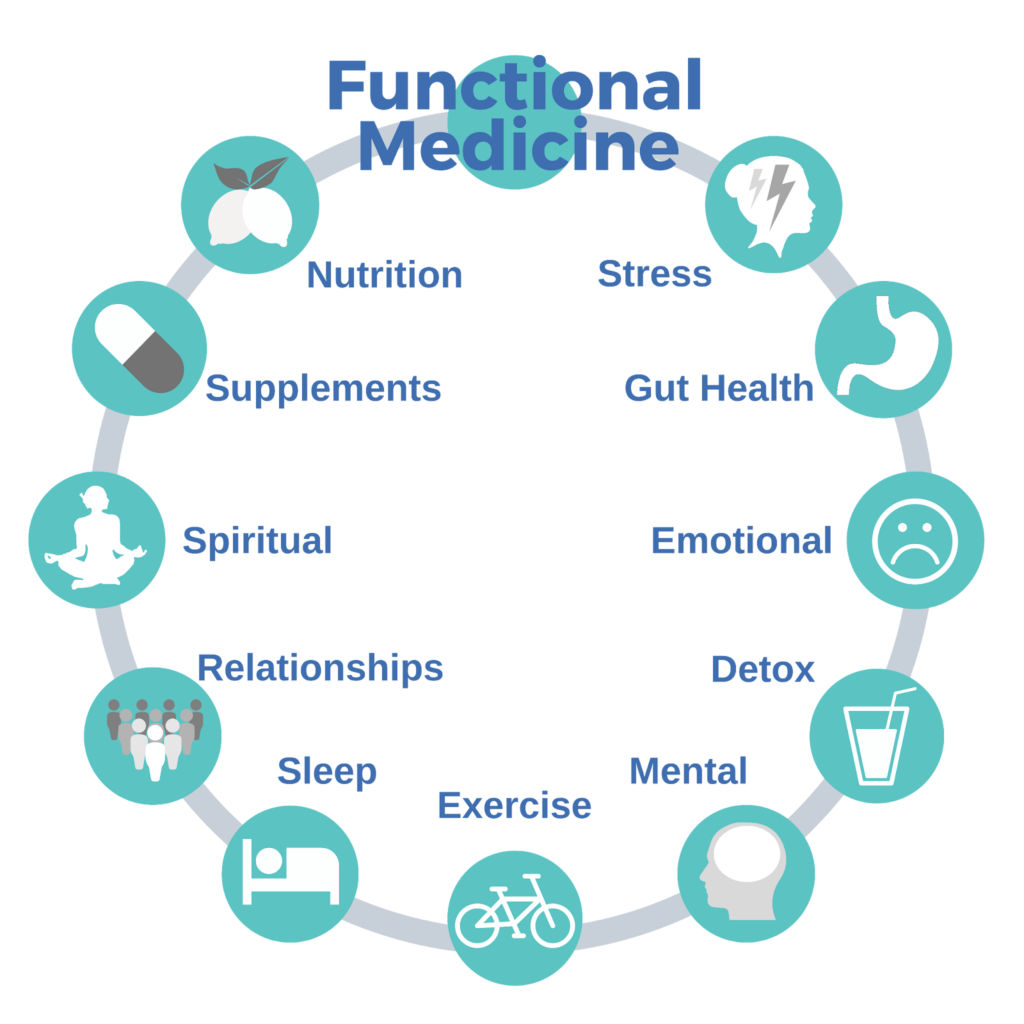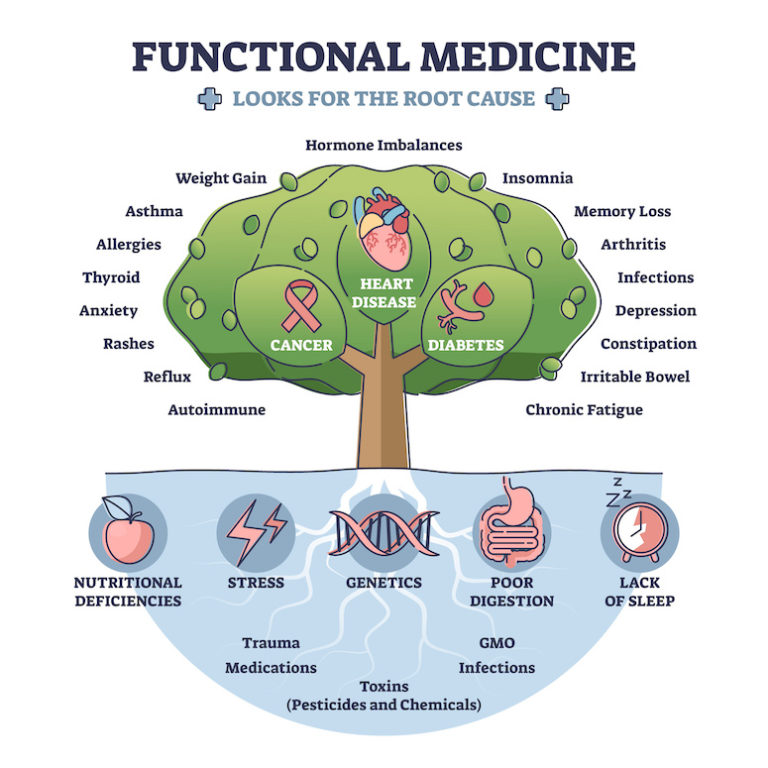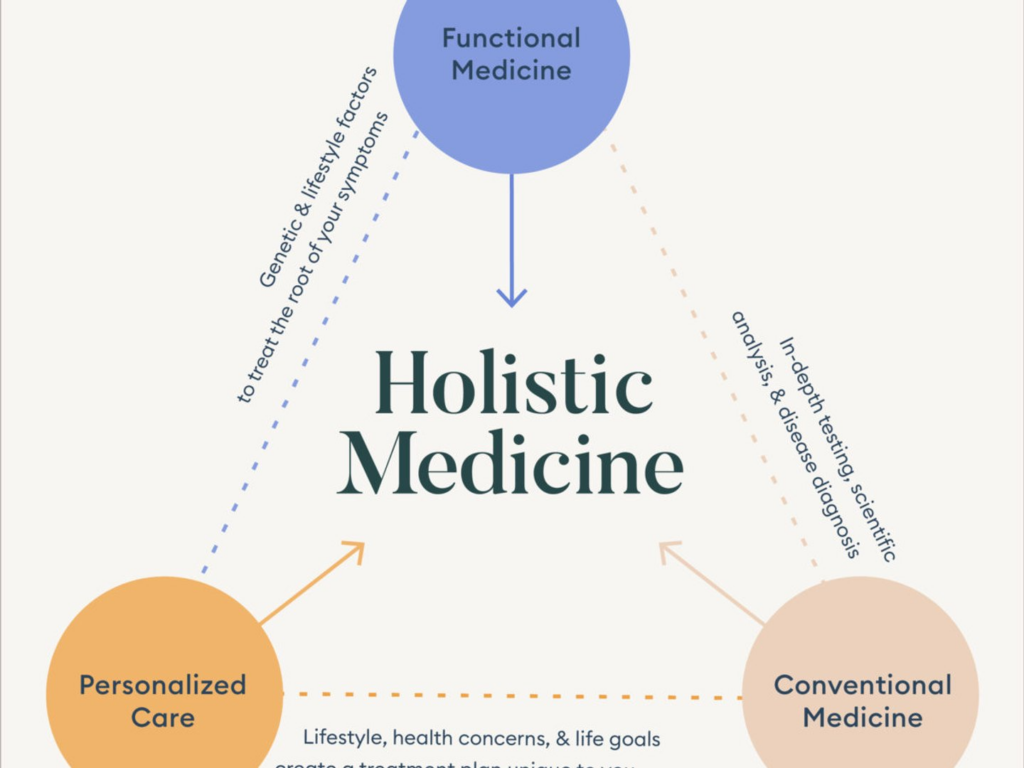
In the last few years, alternative healthcare models have become popular. Holistic medicine and functional medicine are two such models that keep popping up in such conversations. These practices have some similar traits but differ in philosophy as well as methodology.
What Are The Basics of Holistic Medicine?
Basically, Holistic medicine treats the whole person—body, mind, and spirit—using natural therapies and emphasizing prevention, balance, and self-care.
Holistic medicine involves considering a person as a whole entity with body, mind, spirit and emotions. It helps achieve optimal health and well-being. Holistic medicine believes in inter-dependency of all parts of the human being to ensure complete balance.
Holistics usually emphasize on helping patients restore their natural healing powers. Health according to holistics is more than just absence of disease. It is total physical fitness, mental health and social well being.
According to this approach, the patient-practitioner relationship is central to the healing process within a holistic medicine setting. In many instances, holistic doctors spend more time trying to understand patients’ lives from different perspectives to know the underlying causes of various diseases affecting them.
What Are The Basics of Functional Medicine?
Functional medicine focuses on identifying and addressing the root causes of illness, using a personalized approach to treat the whole person.
Functional medicine is an approach to systems biology, which identifies the causes of an illness to provide a cure. Unlike conventional medicine that only treats symptoms and signs, functional medicine aims at understanding complex interactions in history, physiology, and lifestyle leading to illness.
What Is The Functional Medicine Model?

The functional medicine model emphasizes personalized, patient-centered care, addressing root causes of disease through integrative approaches and lifestyle changes.
The main principle behind this type of treatment lies in the fact that every patient is unique and therefore demands particular attention. Functional medicine practitioners adopt holistic approaches by taking into consideration genetic, environmental and lifestyle factors that influence long-term health and chronic illnesses.
Oftentimes this involves multiple tests aimed at identifying imbalances in bodily systems such as the digestive system immune system or endocrine systems.
Functional medicine remains grounded on scientific principles. Practitioners are dependent on current research in genetics and systems biology that helps them understand how diseases progress due to environmental circumstances and lifestyles.
How Does The Scope of Practice Differ Between Functional and Holistic Medicine?
Functional medicine focuses on root causes and personalized treatment plans, while holistic medicine emphasizes overall well-being and integration of mind, body, and spirit.
Holistic Medicine adopts a broader view of health considering physical, emotional, spiritual and social factors. It encompasses a variety of healing modalities, some not supported scientifically.
Though holistic in nature, functional medicine has a more comprehensive system focusing on interconnected physiological processes related to specific health concerns.
What Is The Diagnostic Method of The Two Approaches?
Functional medicine uses in-depth testing and analysis of underlying causes, while holistic medicine relies on comprehensive assessments of overall well-being and lifestyle.
Holistic medicine depends on the observational approach, intuition, and the standard medical diagnosis by doctors. Often, these healthcare providers take into account the overall energy of a patient.
Functional medicine employs advanced diagnosing techniques including genetic, metabolic and microbiome studies aimed at identifying specific imbalances in body functions and abnormal cells.
How Does The Two Treatment Methods Differ?
Holistic medicine uses natural therapies and lifestyle changes, while functional medicine focuses on evidence-based treatments like nutrition and hormone therapy.
Holistic medicine emphasizes more on natural therapies, lifestyle changes, and other alternative practices. It can also include approaches such as acupuncture, homeopathy, or energy healing.
Functional medicine may incorporate some alternative approaches but they are generally more focused towards certain goals evidenced by scientific research. This is often through specific nutritional protocols, hormone therapy, and targeted supplementation.
Does Both Modality Support Patient Involvement?
Yes, both modalities support patient involvement by encouraging active participation in treatment decisions and self-care practices.
Holistic medicine encourages patients’ active participation in their own recovery process which requires them to change their lifestyles and mindset so as to improve their health holistically.
Functional medicine engages patients in the process of treating their diseases with the emphasis that they must strictly adhere to prescribed drug dosages while monitoring biomarkers at all times.
How To Choose Between Holistic and Functional Medicine?

Choose holistic medicine for broad natural approaches and lifestyle changes, and functional medicine for evidence-based, targeted treatments addressing root causes.
You should think of your personal health goals, beliefs, and the health challenges you have when deciding between holistic and functional medicine. A combination of both approaches can work for some people.
Holistic medicine may be more suitable if you want a broad approach to health t to explore other healing modalities.
Functional medicine might be a better fit if you have complex or chronic health, prefer a more targeted approach. It also uses high-level diagnostic tests as guidance in treatment
Are naturopaths functional doctors?
Naturopaths are not necessarily functional doctors; they use natural therapies but may not follow the same evidence-based approach as functional medicine.
While both naturopaths and functional medicine doctors use holistic approaches, they vary in training and methodology. Naturopaths usually stress natural therapies, botanical medicine, and changes in lifestyle to promote the body’s inherent ability to heal itself.
Conversely, functional medicine doctors combine conventional medicine with alternative treatments, focusing on the root causes of illnesses by using cutting-edge diagnostic tests and personalized therapeutic plans.
What to Ask a Functional Medicine Doctor?
Ask about their approach to diagnosis, treatment plans, evidence-based practices, and how they integrate lifestyle changes and patient involvement.
When seeing a functional medicine doctor, find out how they identify underlying problems leading to ill-health. Ask them about the specific diagnostic tests used, ask them how they customize treatments for different patients. Find out how they collaborate with other healthcare providers.
What is the difference between functional medicine and integrative health practitioners?
Functional medicine focuses on root causes and evidence-based treatments, while integrative health combines conventional and alternative therapies for overall well-being.
Functional medicine is characterized by detailed diagnostics that explain biochemical imbalances and genetic susceptibilities, and it aims to treat diseases in a comprehensive manner. On the other hand, holistic health practitioners combine conventional and complementary therapies using hands-on, patient-centered approaches to illness prevention and wellness promotion.
The use of this approach will aid in the optimization of patient outcomes through interdisciplinary collaboration that concentrates on prevention and incorporates mind-body connection into treatment plans.
Conclusion
Both holistic and functional medicine represent a departure from traditional healthcare models due to their focus on personalized care that addresses etiology. Nevertheless, while holistic therapy tends towards all-inclusive healing, functional medicine is more precise and grounded in science. That being said, it’s important for any person seeking medical advice to be aware of these discrepancies.
